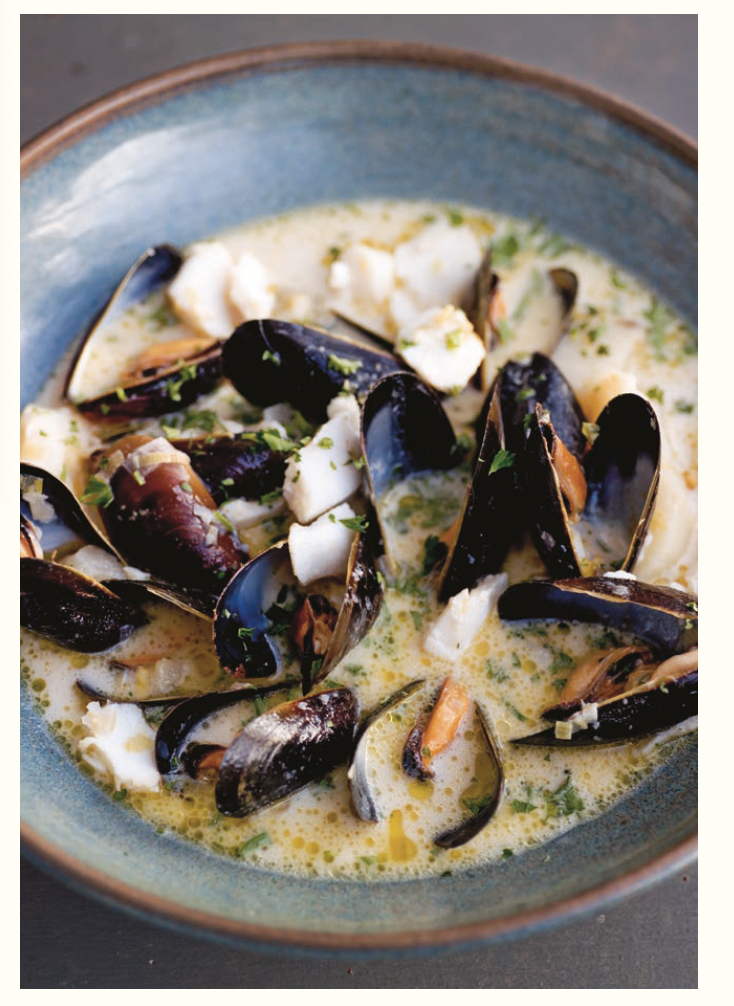Québécois Mussel Chowder with Wine Pairings from Margaret Rand


‘A thick bowl of chowder is spot on in winter. The New England versions, studded with corn or based on tomatoes, seem better for late summer and early autumn eating, but this recipe, from Qu.bec, can be downed when there is two feet of snow on the ground.’ – Diana Henry, author of Roast Figs, Sugar Snow
serves 4 as a main course
1kg (2lb 4oz) mussels
500ml (18fl oz) dry cider
30g (1oz) butter
2 leeks, cut in fine rings
400g (14oz) potatoes,
peeled and cut into 4cm chunks
100ml (3.fl oz) double cream
400g (14oz) skinless cod fillet, cut into 4cm chunks
squeeze of lemon juice
freshly ground black pepper
chopped flat leaf parsley leaves, to serve
Clean the mussels really well, scrubbing the outsides, removing the beards and discarding any that are damaged, open or do not close when tapped on the side of the sink. Put them into a large saucepan and add the cider. Bring to the boil, reduce the heat to a simmer, cover and cook for about 5 minutes, or until the mussels open. Discard any that remain closed.
Melt the butter in a large, heavy-based saucepan and add the leeks and potatoes. Season with pepper. Cover and sweat the vegetables in the butter and a splash of water over a low heat for about 15 minutes, until
starting to soften. Add a little more water every so often to ensure that the vegetables do not burn.
When the mussels are cool enough to handle, remove them from the cider and take the meat out of most of them, keeping some in the shell as they look nice in the final dish (discard any that don’t open). Add the cider and mussel juices to the leek and potatoes and simmer until the potatoes are tender. Gently mash some of the potatoes to slightly thicken the juices.
Add the cream and cod to the pan and, over a gentle heat, poach the cod for 2–3 minutes. Add the mussels to the soup and heat through.
Season with pepper and a good squeeze of lemon juice (you shouldn’t need any salt, as mussel liquor is pretty salty). Scatter with the parsley and serve.
This recipe is an extract from Roast Figs, Sugar Snow by Diana Henry.
Margaret Rand, author of Hugh Johnson’s Pocket Wine Book has created the perfect wine pairings for this delicious dish
The mussel chowder offers very different flavours. You could be conventional and choose a Greek white like Assyrtiko, with tension and acidity, and enough weight and richness – there’s cream in the dish, as well as cider. Lots of supermarkets and wine merchants have Assyrtiko now, and the general standard is high.
Or, if you wanted to surprise people, you could choose an orange wine. A what? Orange wine is made from white grapes fermented on their skins – which gives it an orange tinge. Not mandarin-coloured (not usually, anyway); it’s more subtle than that. Orange wines have depth, lots of flavour and a touch of tannic grip, which makes them ideal for lots of food. If you can track down a Ribolla Gialla or a Vermentino – they’re both grape varieties – then you’re in business. Italy, Croatia, Slovenia and and round there are where to look. Some ideas: Solara Orange from Viile Timisului in Romania, Terre di Nonno Vermentino from Sicily or, from England, Litmus Wines Orange Bacchus. The flavours will be a surprise the first time you taste them, but but don’t be put off. They’re great food wines. And brilliant with mussels.

Margaret Rand has been general editor of Hugh Johnson’s Pocket Wine Book for some 15 years and now, with Hugh’s retirement, has taken over the hot seat. The book’s mix of personal insight and informed recommendations have made it the world’s best-selling annual wine book. Margaret Rand’s curiosity about wine started several decades ago and led her to a career of writing about wine and editing wine magazines, with the occasional foray into whisky. Her books include Grapes & Wines and 101 Wines to Try Before You Die; she also writes regularly for The World of Fine Wine, timatkin.com and winesearcher.com. When she’s not writing about wine she’s probably walking, reading, or in the kitchen, cooking.






